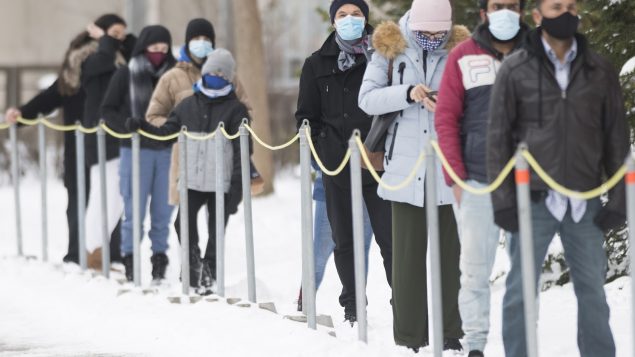A group of experts concerned about the rising number of cases and hospitalizations due to the COVID-19 pandemic is calling on provincial and federal health officials to recognize the airborne transmission of the virus.
In an open letter released on Monday, 363 experts, scientists, occupational health specialists, engineers, physicians and nurses across Canada asked that government officials update their COVID-19 guidelines, workplace regulations and public communication to reflect that COVID-19 is spread through aerosols, tiny liquid droplets that stay in the air.
“Prevention messages from provincial governments continue to be deficient,” the authors of the open letter said. “They do not adequately inform the population about the risks of airborne transmission in shared room air.”
“Employers in workplaces and public institutions must be fully aware of the risks of aerosol transmission and the measures that can be taken to properly limit these risks,” the letter added.
One of the authors of the letter, Jennifer McDonald, a rehabilitation physician in Ottawa, said governments have been slow to respond to the issue and ignored the importance of ventilation and air quality.
The group of experts proposed that governments update their health directives to account for the risk of transmission of COVID-19 through aerosols, inspect and upgrade ventilation systems in public spaces such as schools and long term care facilities, to develop and to integrate clear ventilation standards for indoor institutions and business, as well as ensure that high risk health care workers and essential workers have proper access to respirators such as the N95 mask.
The open letter also said that with activities moving indoors because of the winter, it is important that workplaces and individuals understand the risk of airborne transmission of the virus, as well as the ways to minimize it.
COVID-19 cases have been on a rise across the country. According to CBC News, as of Monday afternoon, the country has reported a total of 607,615 cases, including 82,735 active cases.
McDonald said the writers of the letter–sent to the Canadian government and each province–hope the number of experts and signatures will mean that health officials take it seriously.
The Public Health Agency of Canada’s (PHAC) website notes that reports of outbreaks in places with poor ventilation suggest that aerosols were in the air and that people inhaled the virus. However the website also said that there is no evidence at this time that the virus is able to transmit over long distances through the air.
Radio Canada International reached out to the Public Health Agency of Canada for further comment on the open letter, but they referred to the information on aerosols that is posted on their website.
With files from CBC News







For reasons beyond our control, and for an undetermined period of time, our comment section is now closed. However, our social networks remain open to your contributions.